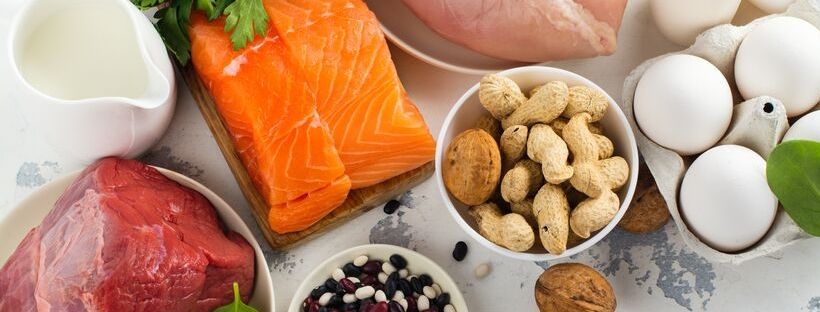
By Jen Houchins PhD, RD
For only 70 calories, eggs provide 6 grams of high-quality protein, which is 12% Daily Value (% DV) on the Nutrition Facts label. The % DV accounts for both the amount of protein and is adjusted for protein quality (eggs have the highest protein quality score).1 Almost 60% of the protein is found in the egg white, and more than 40% in the yolk.2 While people often choose eggs because of the high-quality protein, eggs are a complex nutrient-rich food that provides so much more. New research is exploring how the different components of eggs may impact health.
Besides protein, large eggs have 4.75 grams of total fat, which is rounded to 5.0 grams on the label. Eggs primarily contain mono- and poly-unsaturated fat (2 grams, and 1 gram, respectively) and also contain 1.5 g saturated fat. The 2015 DGA recommends that “Individuals should aim to shift food choices from those high in saturated fats to those high in polyunsaturated and monounsaturated fats,” and reduce saturated fats intake to less than 10 percent of calories per day.3 The fat composition of eggs is consistent with this recommendation. In fact, eggs “…only contribute about 2.5% of total saturated fatty acid intake among U.S. adults.4,5”
Of additional interest to the Egg Nutrition Center are the components in eggs that don’t show up on the label. For example, eggs are a bioavailable food source of lutein + zeaxanthin (252 mcg per large egg),2 and a source of phospholipids, which are components of all biological membranes (~1.3 g per large egg).4 Emerging research shows these dietary components can have a positive impact on health.6
A recent study in mice added 0.1% egg sphingomyelin (a class of phospholipid) into a high-fat, cholesterol-enriched diet and compared to a control diet. After eight weeks, there was no difference found in serum lipids between groups, but the mice fed the sphingomyelin-enriched diet had less lipid accumulation in the connection between the heart and the aorta (aortic root). These preliminary data indicate egg sphingomyelin may have the potential to help prevent atherosclerosis, however, further research in a clinical setting is needed to better understand the impact in humans.7
One of the Dietary Guidelines for Americans key recommendations is to include a variety of protein foods, including seafood, lean meats and poultry, eggs, legumes (beans and peas), nuts, seeds, and soy products.3 As part of the protein food group, eggs are an especially nutrient-dense choice that can help meet not only protein requirements, but also provide a mixture of fats, vitamins, minerals, and dietary components that are associated with health. For more information on dietary components in eggs and the relationship to health, please see our recent public comments submission.
Resources
- Schaafsma, G., The protein digestibility-corrected amino acid score. J Nutr, 2000. 130(7): p. 1865s-7s.
- U.S. Department of Agriculture and Agricultural Research Service. FoodData Central. 2019; Available from: https://fdc.nal.usda.gov/index.html.
- U.S. Department of Health and Human Services and U.S. Department of Agriculture. 2015-2020 Dietary Guidelines for Americans. 2015; 8:[Available from: http://health.gov/dietaryguidelines/2015/guidelines/].
- Blesso, C.N. and M.L. Fernandez, Dietary Cholesterol, Serum Lipids, and Heart Disease: Are Eggs Working for or Against You? Nutrients, 2018. 10(4).
- O’Neil, C.E., et al., Food sources of energy and nutrients among adults in the US: NHANES 2003-2006. Nutrients, 2012. 4(12): p. 2097-120.
- Blesso, C.N., Egg phospholipids and cardiovascular health. Nutrients, 2015. 7(4): p. 2731-47.
- Millar, C.L., et al., Dietary Egg Sphingomyelin Prevents Aortic Root Plaque Accumulation in Apolipoprotein-E Knockout Mice. Nutrients, 2019. 11(5).
5 Ways To Build An Egg Bowl

The Egg Nutrition Center partnered with Natalie Rizzo, MS, RD to write this blog post.
Here’s a common dilemma I hear from many folks: You want to prepare and eat a nutritious meal, but picking out and cooking a recipe takes too much time and energy. Don’t reach for the take-out app just yet. If you’re overwhelmed with recipes, I have the ultimate solution for you– a no-recipe egg bowl formula. It’s a simple blueprint to help whip up a satisfying meal on the fly without any recipe reading.
Here’s the simple formula to get you on your way to lunch or dinner success:
1 to 2 cups of veggies + ½ cup of whole grains + 1 large egg + 1 tablespoon sauce.
The 2015-2020 Dietary Guidelines for Americans recommend eating 2½ cups of vegetables per day, and this egg bowl helps you meet those recommendations. Start by picking out your favorite veggie(s) and build the bowl from there. If you opt for more than one vegetable, try to eat different colors for a variety of nutrients.
Next, add a whole grain. MyPlate recommends filling a quarter of your plate with a grain. Whole grains provide fiber and protein, two nutrients that contribute to satiety, as well as heart health and muscle growth. There are a ton of tasty and affordable whole grain options to choose from, such as brown rice, farro, oats, bulgur, barley and more.
Your bowl already has some protein, vitamins and minerals, but top it with an egg to add even more nutrition. Eggs naturally provide many essential nutrients, such as Vitamin B12, biotin, iodine, selenium, choline, riboflavin, pantothenic acid and protein. Not to mention that they are one of the only foods that naturally have Vitamin D, which along with calcium, is critical for building strong bones. Eggs are also an important part of a plant-forward diet, especially since they aid in the absorption of nutrients found in plant foods, such as vitamin E and carotenoids.
What’s more, eggs contain important nutrients for brain health, including choline and lutein. Choline is critical for brain development during pregnancy and infancy, but approximately 90% of pregnant women don’t get enough of this essential nutrient. Two large eggs supply more than half of the recommended intake for pregnant women and can help them meet their needs. Lutein has long been associated with eye health and emerging research shows lutein may also play a role in cognition too.
Lastly, don’t forget to add a sauce to your egg bowl for flavor and even more nutrients. Opt for sauces made with healthy oils, vegetables, beans and/or legumes. If you need a little inspiration, make sure you check out the five simple egg bowl suggestions below.
- Fall Harvest Egg Bowl: oven-roasted Brussels sprouts & cauliflower + wheatberries + over easy egg + balsamic vinaigrette
- Pesto Egg Bowl: oven-roasted crispy broccoli & sun-dried tomatoes + farro + poached egg + pesto
- Mexican Egg Bowl: fresh shredded purple cabbage & corn + brown rice + fried egg + salsa
- Green Tahini Egg Bowl: fresh kale & shelled edamame + quinoa + sunny side up egg + tahini sauce (whisk together 1 tablespoon of tahini, a pinch of salt and a splash of water)
- Mediterranean bowl: fresh cherry tomatoes & sliced cucumber & olives + lentils + hard boiled egg + hummus
PROTEIN FOODS FROM A VARIETY OF SOURCES CONTRIBUTE TO NUTRIENT ADEQUACY

Featured article in the Fall 2019 Issue of Nutrition Close-Up; written by Mickey Rubin, PhD
There has been considerable debate recently around the topic of protein quality, particularly regarding the best way to measure protein quality1 as well as the relative importance of dietary protein quality as it relates to important health outcomes, such as muscle loss with aging.2 While this discussion is important and will no doubt continue as research in this area evolves and new measures for protein quality are developed,3 less attention is often given to the important contribution of protein foods to overall nutrient adequacy. Commonly consumed protein foods contribute to nutrient intake, diet quality, and nutrient adequacy, independent from their contributions to total protein intake.4
Strategies for Protecting Children’s Eye Health

By Jessica Ivey, RDN, LDN
The Egg Nutrition Center partnered with Jessica Ivey, RDN, LDN to write this blog post. Jessica’s opinions are her own.
August is Children’s Eye Health and Safety Month. As the kids head back to school this fall, they’ll likely be spending more time looking at books and/or screens. Did you know that spending long periods of time reading, writing, watching videos, or other “near work” can create eye strain? There are several things you can do to help protect your child’s eyes.
Remember the 20-20-20 rule.
You blink less when looking at a screen, whether it be a computer, e-reader or television, which can lead to digital eye strain and dry eye. Take a 20 second break and look about 20 feet away once every 20 minutes. You can use a timer on digital devices to remind your child to take a break.
Get outside.
Studies have shown that spending time outside may lower the risk of nearsightedness in children and teens.1 More research is needed to determine whether this benefit comes from exposure to daylight or exercising distance vision. Be sure that children and adults alike wear UV-blocking sunglasses to protect their eyes from long-term UV damage.
Eat your eggs.
One of the best ways to promote eye health is to eat a nutritious, balanced diet. Eggs are a source of lutein and zeaxanthin (252 mcg per large egg), two carotenoids important for eye health. Exposure to too much blue light may cause damage to the eye2 and these carotenoids block blue light from sunlight and digital devices, helping to protect the eyes. There are also long-term benefits as higher intake of lutein and zeaxanthin is associated with a reduced risk of advanced age-related macular degeneration.3 Lutein and zeaxanthin are also found in several vegetables, including spinach, Brussels sprouts, green peas, broccoli, summer squash, and corn, but because lutein is fat-soluble, your body is better able to absorb and use the lutein found in eggs thanks to the fat found in the yolks.
Try these nutrient-rich recipes featuring eggs.
- Send your child off to school with a protein-rich breakfast, like these Quinoa Egg Muffins.
- Pack a Cobb Salad Wrap and a piece of fruit for a flavorful balanced lunch.
- Serve Egg Pita Snackers for a satisfying after-school snack.
Jessica Ivey, RDN, LDN, is a dietitian and chef with a passion for teaching people to eat healthy for a happy and delicious life. Jessica offers approachable healthy living tips, from fast recipes to meal prep guides and ways to enjoy exercise on her website, JessicaIveyRDN.com. Follow her on Facebook and Instagram.
References
- Sherwin JC, Reacher MH, Keogh RH, Khawaja AP, Mackey DA, Foster PJ. The association between time spent outdoors and myopia in children and adolescents. Ophthalmology. 2012;119(10):2141–2151.
- Scientific Committee on Emerging and Newly Identified Health Risks (SCENIHR). 2012. Health Effects of Artificial Light (https://ec.europa.eu/health/scientific_committees/emerging/docs/scenihr_o_035.pdf)
- Johnson EJ. Role of lutein and zeaxanthin in visual and cognitive function throughout the lifespan. Nutr. Rev. 214;72(9):605-12.
Macular Pigment Links to Eye and Brain Health

By: Jen Houchins, PhD
The dietary carotenoids lutein and zeaxanthin (yellow pigments) selectively accumulate in the retina of the eye and can be measured non-invasively with a test easily conducted outside the clinic. The result of this short visual assessment is reported as Macular Pigment Optical Density (MPOD), which can range from 0 to values over 1 log unit, with an average around ~0.35.1 MPOD measures the amount of lutein + zeaxanthin in the retina. Since these carotenoids cannot be synthesized by the human body, MPOD is a direct reflection of the habitual diet. Emerging science continues to link MPOD to eye and brain health across the lifespan, which is eggciting news for egg fans, as eggs are a bioavailable food source of lutein.
The accumulation of lutein in the fovea of the retina supports eye health likely though its’ ability to act as an antioxidant and anti-inflammatory agent, capacity to absorb damaging blue light (short wavelengths), and potentially by enhancing communication among neurons. As summarized in a recent presentation and new review paper, macular pigment is linked to visual function and is associated with reduced risk of age-related macular degeneration (AMD). MPOD been studied in relation to speed of visual processing, contrast sensitivity, the ability to recover visibility after a bright flash of light, and various other measures of visual function. The totality of the literature supports that dietary lutein is important for eye health across the lifespan. 1
Recent data also demonstrate that macular pigment is related to brain lutein levels, allowing MPOD to be used as a non-invasive biomarker in studies studying cognitive outcomes. 2,3 As previously shared, emerging data link MPOD to measures of math and written comprehension in preadolescent children and various studies connect lutein status to indicators of cognitive function in older adults. Overall, macular pigment appears to be a reliable biomarker of brain lutein concentration across the lifespan, and is potentially valuable for assessment of cognition. 1,4
Most Americans do not consume an adequate amount of lutein + zeaxanthin to increase MPOD, with an average intake ~1-2 mg/day, below the suggested 6 mg/day to maintain eye health. 5 However, the good news is that increasing dietary lutein through foods and/or supplements can increase MPOD in most people. 1, 6 Lutein can be found in a variety of foods, including green leafy and other vegetables such as broccoli, brussels sprouts, and avocados. A large egg provides 252 mcg lutein + zeaxanthin in a highly bioavailable form and egg consumption may help build macular pigment. One study in women between the ages of 24-59 found that eating 6 eggs/week increased MPOD over a 12-week period, with a larger increase observed in participants with lower baseline MPOD levels. 6
So regardless of your age, current research indicates that a habitual diet that includes various food sources of lutein can help support eye and brain health. Please explore our recipes to find new ways to prepare and eat eggs!
References
- Stringham, J.M., E.J. Johnson, and B.R. HAmmond, Lutein Across the Lifespan: from Childhood Cognitive Performance to the Aging Eye and Brain. Curr Dev Nutr, 2019.
- Vishwanathan, R., W. Schalch, and E.J. Johnson, Macular pigment carotenoids in the retina and occipital cortex are related in humans. Nutr Neurosci, 2016. 19(3): p. 95-101.
- Vishwanathan, R., et al., Macular lutein and zeaxanthin are related to brain lutein and zeaxanthin in primates. Nutr Neurosci, 2013. 16(1): p. 21-9.
- Wallace, T.C., A Comprehensive Review of Eggs, Choline, and Lutein on Cognition Across the Life-span. J Am Coll Nutr, 2018. 37(4): p. 269-285.
- Johnson, E.J., et al., Intake of lutein and zeaxanthin differ with age, sex, and ethnicity. J Am Diet Assoc, 2010. 110(9): p. 1357-62.
- Wenzel, A.J., et al., A 12-wk egg intervention increases serum zeaxanthin and macular pigment optical density in women. J Nutr, 2006. 136(10): p. 2568-73.
